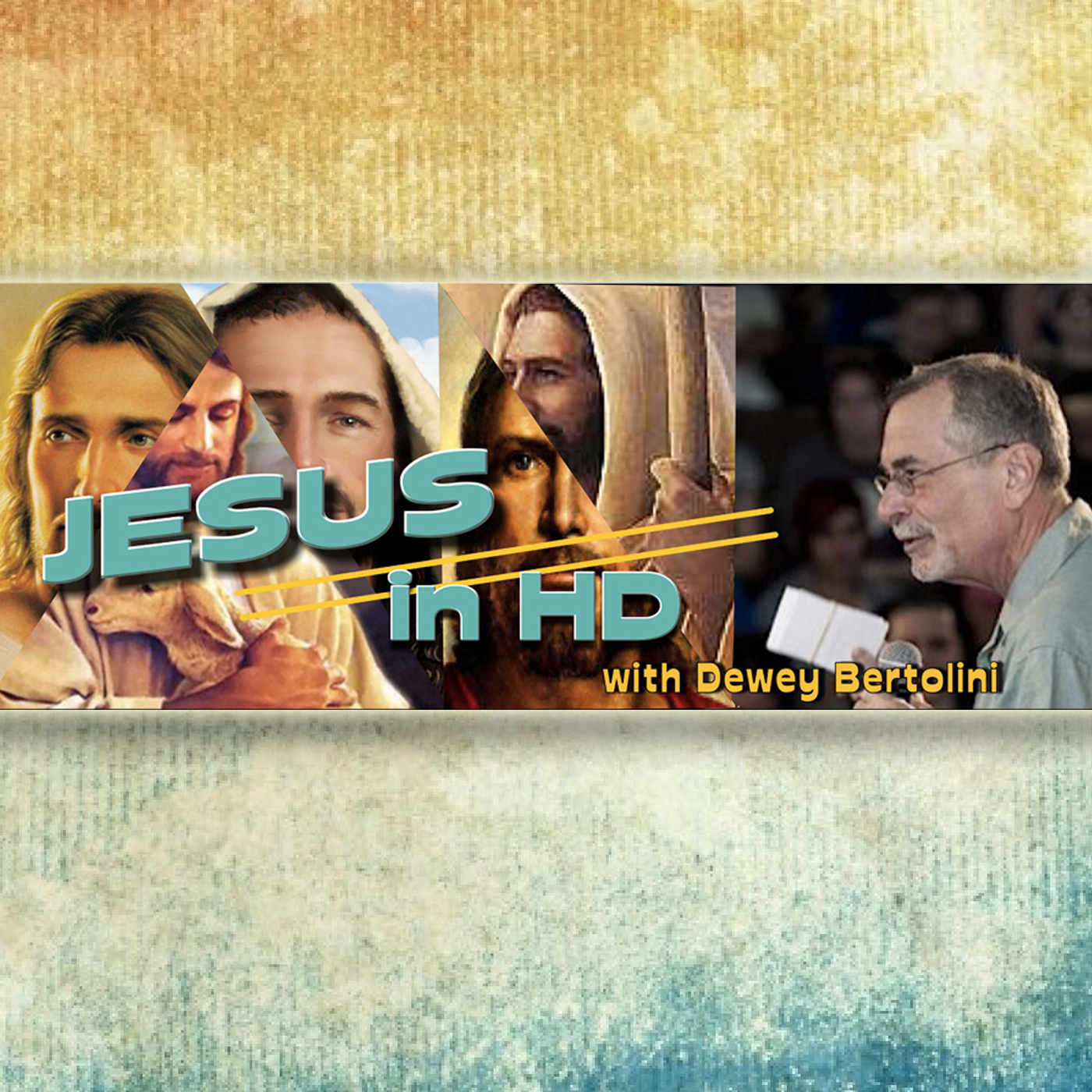
 Jesus in HD 145: "Let the Reader (or Hearer) Understand!" Play Now | Play in Popup | Download
Jesus in HD 145: "Let the Reader (or Hearer) Understand!" Play Now | Play in Popup | DownloadWelcome to December.
Not our December, I’m talking about Jesus’ final December.
As John observed in John 10, it was winter, and Jesus was in Jerusalem for what John calls the Feast of Dedication.
As we break seal on this story, we are now a mere four months from the crucifixion.
When we last left Jesus, He had just healed a man born blind following the Feast of Tabernacles in October. This led to a rather heated confrontation with the religious leaders who kicked the now-healed blind man out of synagogue and denied that this man was ever blind. When that didn’t work, because everyone in Jerusalem knew this formerly blind-beggar, they accused Jesus of healing Him in the power of Satan. The confusion caused by these Pharisees left the crowd reeling. Thus we read,
“Many of them said (of Jesus), ‘He has a demon and is mad. Why do you listen to Him?’ Others said, ‘These are not the words of one who has a demon. Can a demon open the eyes of the blind?’”
That’s verse 21. And that happened in October. Next we read in verse 22,
“Now it was the Feast of Dedication in Jerusalem, and it was winter.”
A full two months transpired between John 10:21 & 22. Indeed, after that heated and life-threatening exchange with the Jewish leaders, Jesus and His men got out of Dodge. Jesus needed to, since once again Pharisees wanted to kill Him.
So here’s my question: Why in the world, then, did Jesus risk returning to Jerusalem here in the winter? Why did Jesus literally put His life at risk to be there?
The answer is profound.
You see, unlike Passover, Pentecost or the Feast of the Tabernacle, the Feast of Dedication is not a pilgrimage feast. So, while it may seem to make some sense that Jesus returned to Jerusalem at this time to celebrate the Dedication Feast, the truth is that there aren’t records of any Jews making the trek to do so. Some may voluntarily do it, but it’s not commanded at all.
In fact, the Dedication feast isn’t even Biblical. It’s not found anywhere in the Old Testament. It wasn’t even conceived until 200 years after the Old Testament was written. This doesn’t mean that the festival isn’t well known today. It’s rarely called the Dedication Festival anymore, but more often the Festival of Lights, or Hanukkah. The word Hanukkah actually means “Dedication”.
So, what was it about this particular Hanukkah that compelled Jesus to risk His life?
Well, some 600 years before Jesus was born, we read this in Daniel 9:
“…a ruler will arise whose armies will destroy the city (Jerusalem) and the Temple. The end will come with a flood, and war and its miseries are decreed from that time to the very end. 27 The ruler will make a treaty with the people for a period of one set of seven, but after half this time, he will put an end to the sacrifices and offerings. And as a climax to all his terrible deeds, he will set up a sacrilegious object that causes desecration, until the fate decreed for this defiler is finally poured out on him.” (Daniel 9:26-27)
Now, all of this is fleshed out in minute detail in John’s Book of Revelation. But, when you take this passage and put it side-by-side with Matthew 24, we see Jesus huddling with His disciples as they pepper Him with questions about this future era that Daniel wrote about. Jesus replied,
“So when you see standing in the holy place ‘the abomination that causes desolation,’ spoken of through the prophet Daniel—let the reader understand—16 then let those who are in Judea flee to the mountains… 21 For then there will be great distress, unequaled from the beginning of the world until now—and never to be equaled again. (Matthew 24:15-21)
This person who Daniel and Jesus talk about who will make a peace treaty in the Middle East and set up an abomination in Jerusalem’s Holy of Holies is well known to Christ-followers as the Anti-Christ. He will present himself to the world as a peaceful leader and the world will, as it does now, crave for peace so it will embrace him en masse. In fact, the Book of Revelation says that the whole world will fall at his feet and worship him.
But half-way through his seven-year treaty, the mask will come off, and he will be exposed for who he really is.
3 Don’t be fooled by what they say. For that day will not come until there is a great rebellion against God and the man of lawlessness is revealed—the one who brings destruction. 4 He will exalt himself and defy everything that people call god and every object of worship. He will even sit in the temple of God, claiming that he himself is God…
9 …This man will come to do the work of Satan with counterfeit power and signs and miracles. 10 He will use every kind of evil deception to fool those on their way to destruction, because they refuse to love and accept the truth that would save them. 11 So God will cause them to be greatly deceived, and they will believe these lies. 12 Then they will be condemned for enjoying evil rather than believing the truth. (2 Thessalonians 2:3-12)
So, as we see these prophecies of Daniel, Jesus and Paul, we see a peek into all of our futures – Daniel the Old Testament Prophet, Jesus the New Testament Messiah, Paul the New Testament Apostle, and you and I the 21st Century Christ-followers.
However, when we look at another prophecy from Daniel, this time in chapter 10 of his book, we see a description of a day in Daniel’s future, but in Jesus’ past:
21 “The next to come to power will be a despicable man who is not in line for royal succession. He will slip in when least expected and take over the kingdom by flattery and intrigue. 22 Before him great armies will be swept away, including a covenant prince. 23 With deceitful promises, he will make various alliances. He will become strong despite having only a handful of followers. 24 Without warning he will enter the richest areas of the land. Then he will distribute among his followers the plunder and wealth of the rich—something his predecessors had never done. He will plot the overthrow of strongholds, but this will last for only a short while.
25 “Then he will stir up his courage and raise a great army against the king of the south. The king of the south will go to battle with a mighty army, but to no avail, for there will be plots against him. 26 His own household will cause his downfall. His army will be swept away, and many will be killed. 27 Seeking nothing but each other’s harm, these kings will plot against each other at the conference table, attempting to deceive each other. But it will make no difference, for the end will come at the appointed time.
28 “The king of the north will then return home with great riches. On the way he will set himself against the people of the holy covenant, doing much damage before continuing his journey.
29 “Then at the appointed time he will once again invade the south, but this time the result will be different. 30 For warships from western coastlands will scare him off, and he will withdraw and return home. But he will vent his anger against the people of the holy covenant and reward those who forsake the covenant.
31 “His army will take over the Temple fortress, pollute the sanctuary, put a stop to the daily sacrifices, and set up the sacrilegious object that causes desecration. (Daniel 11:21-31)
These words, and even the paragraphs that follow, are an incredible and greatly detailed 100% accurate prophecy. While Daniel’s two prophecies may appear similar – even identical – to the untrained eye, they are actually two distinct events with the similar occurrence of a despicable ruler setting up the sacrilegious object that causes desecration, or as some translations call it, “the abomination of desolation”.
Nevertheless, these are two different events: Daniel’s prophecy in chapter nine being the future anti-Christ; and the ruler described in Daniel 11 was Antiochus Epiphanes.
So, what’s going on here?
167 B.C. was a year long lived in infamy. This was the year that Antiochus Epiphanes – a Greek king who honestly believed that the was the physical incarnation of Zeus – continued the vision of his forefather, Alexander the Great of spreading their empire across the known world and viciously attacked Jerusalem.
As the Greek kings did this, Hellenism – the worship of man as god – spread along the Greek empire’s way by controlling education, sports and the arts. Now, while Alexander didn’t put an end to the Jews’ worship of God, meeting in Synagogue or reading and studying the Torah, Hellenism still spread throughout like wildfire by taking hold of those three aspects of life.
But when Alexander died, his empire was divided between his generals. The portion of the globe that contained Israel went to Antiochus III, who continued Alexander’s policy of tolerance and assimilation. And, as in the days of Alexander, it was effective as scores of young Jews assimilated to Hellenism and the Greek humanistic way of life.
Nevertheless, there remained a remnant of Jews who resisted Hellenism and were faithful to the God of Abraham, Isaac, and Jacob.
Then came the despicable Antiochus IV, aka Antiochus Epiphanes.
Under his reign, everything changed dramatically and immediately. At the time, the Jews were the only monotheists in the world and he could not handle any of his subjects refusing to assimilate and bow down before him as king of the gods. So, he began to pass laws aiming to eradicate Judaism forever. He forbade them from observing the Sabbath and outlawed all of their holy days. Studying Torah and keeping a kosher diet became capital offenses. Jewish scholars were hunted down and killed and circumcision was outlawed as well. No one was safe.
Ultimately, Antiochus Epiphanes set his eyes on God’s holy temple.
He invaded it and turned it into a pagan sanctuary in honor of Zeus. He violated the Holy of Holies and walked behind the giant curtain and positioned himself on the Ark of the Covenant, claiming that he was god. He then sacrificed a pig on that holy altar and dragged the entrails of the sacrifice across defiled every stone of God’s “house”. He melted down the menorah, which symbolized the Light of God and destroyed it. The Jews called all this the abomination of desolation.
Yet, with all of that, God’s hand still remained upon the Jews – His chosen people – and decidedly against Antiochus Epiphanes.
A Jewish man named Judah Maccabee had hid away from the Greek forces, leading a band of faithful men who refused to assimilate to Hellenism. Over the course of several months, this ragtag bunch of faithful warriors overcame the far more mighty and militarily superior Hellenists. Each of their victories were nothing less than miracles of the Almighty God. There is no other explanation.

When they finally seized back their now defiled Temple, the first thing they did was to recreate a new, makeshift, menorah. They simply could not stomach the thought of God’s house without the flame of God’s light shimmering and flashing within its halls as a symbol of God’s holy presence in Israel. The problem they ran into was that they could only find a single flask of purified oil, which the Old Testament dictates to be used to light the menorah – only enough for one full day. However, there were eight days ahead of them in order to purify the Temple and a new batch of oil. In yet another miracle, the menorah remained lit – off of that one flask of oil – for eight full days.
God did not abandon His people.
The newly cleansed Temple was dedicated to God on the 25th day of Kislev (which coincides with our winter month of December) with songs and great celebration for a full eight days. This annual celebration came to be known as the Feast of Dedication, as they celebrate the dedication of the newly cleansed Temple. Over time, this same feast was known as the Festival of Lights, or Hanukkah (which means “Dedication”).
While Hanukkah may not be a Biblical feast, it is definitely an historical feast!
So, getting back to our original question: Why would Jesus risk his life to go to Jerusalem to celebrate the Feast of the Dedication as we read in John 10?
He was there to celebrate the reclamation and Dedication of His Father’s house!
So, as Jesus returned to Jerusalem, we learn three lessons:
- Good will always win out over evil – no matter how evil the evil and how hopeless the times may be.
- God always keeps His word. Just as the prophecy in Daniel 11 was fulfilled in all its detail, so the prophecy in Daniel 9 will be fulfilled in all of its detail, as will the prophecies in Revelation detailing Jesus’ return in all of His glory, defeating the anti-christ and winning the day!
- There are some things in this life worth dying for. And if and when that time comes, we should pray that we will have the strength and faith to stand firm in God’s promises.










